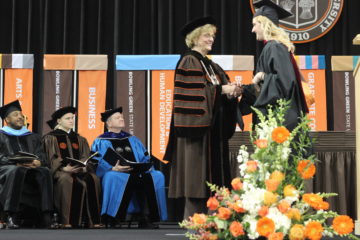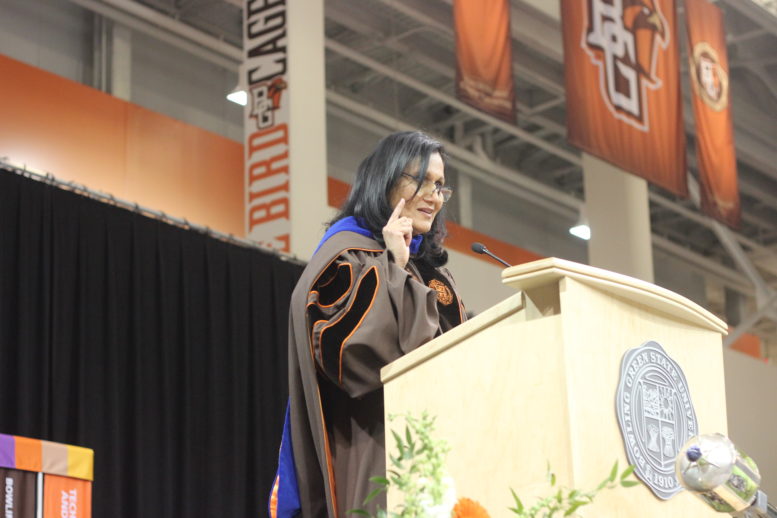By DAVID DUPONT
BG Independent News
Imagination shapes the world, Vandana Pednekar-Magal told those at Bowling Green State University graduation ceremonies Friday night.
Pednekar-Magal, who received her masters and doctoral degrees from BGSU before going on to a career as a filmmaker and educator, was addressing the commencement for the Graduate College, and Colleges of Business, Health and Human Service, Musical Arts, and Technology, Architecture and Applied Engineering. Students from the Colleges of Arts and Sciences and Education and Human Development graduated on Saturday.
Pednekar-Magal, who teaches journalism and communication studies at Grand Valley State University in Michigan, preceded them on this journey.

President Mary Ellen Mazey presided over her final BGSU graduation ceremonies this weekend.
The native of Bombay, India, she recalled trudging from West Hall to her apartment on Sixth Street through freezing rain and blowing snow, eating Wonder bread and canned beans.
She’d left behind in India a career in journalism, “giving up a real job, a real income” to subsist on a meager graduate assistantship In Bowling Green. Also she left behind the comfort of family.
This is an immigrant’s transition, she said.
All the students, though, were now making their own transitions. Yes, graduation was a cause for celebration. It is also initiation into new responsibilities to colleagues, a profession, and family.
In entering this new stage, she told them they should reflect on their experiences. “Reflection will let you identify your capabilities so you can capitalize on them.”
There were times when they did not live up to the expectations of others or even themselves, Pednekar-Magal. Then they “discovered the seeds of their capabilities,” their ability to work harder and better.
Other times, they may have been thwarted by “not being in the right place in the right time.” There’s an element of chance in life, Pednekar-Magal said. “Life is not fair.”
This can lead “you to cultivate empathy,” she said. Knowing that they felt unfairly treated, “you will try to be fairer and just to others.”
People are faced with situations “created outside your control or influence” that “deeply affect your life.” This is the law of nature or how the world works.
“Your education has given you the means of making sense of what’s happening in the word in a more freethinking and imaginative way,” Pednekar-Magal said. “Between the larger world and ourselves, there lies a space. In that space is our power to choose our response, in that space lies our road, our hope and our freedom.”
She said she found this in refugees she interviewed for a documentary film. They had been displaced by war, had seen their homes destroyed, and people dying.
They had come to America with little. Yet now they had started families and new lives in Grand Rapids, Michigan. Their ability to imagine sustain them through their troubles.
“Imagination is an internal compass that allows us to navigate in the world,” she said.
It helps shape what people how they vote and what issues they care enough to fight for. It will shape, she told the graduates, “the knowledge you create, the art you make, and the spaces you design. Will they make a difference in the world? Choose your response in a way that will include imagination for yourself and others.”
Among those imagining a new life for herself is President Mary Ellen Mazey who was presiding over her final BGSU graduation ceremonies. She announced earlier this month that she will retired on Dec. 31.
Her decision, she has said, was prompted by her reflection on the death of Steve Krakoff, the vice president for capital planning and campus operations, in October.
Krakoff worked for the university since 2008. University trustees earlier this month noted he “led the planning and implementation of more than $500 million in infrastructure improvements – the largest building and renovation program in BGSU history.”
At the time of his death, he was near completion on work for a doctorate in Leadership Studies. Earlier this month, the trustees granted that degree posthumously to his widow, Diane.
On Friday his name was listed in the program with the names of the graduates whose studies his work had influenced.





